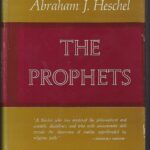Rev Colin Bossen
Fifty years later, we're in a place where dialogue is so difficult, and I celebrate Heschel who relished those moments and found many ways to be in conversation.
First Unitarian Universalist Church of Houston
Houston, Texas
A Christian Perspective
Transcribed from an interview
I consider Heschel one of the religious giants of the 20th century, and it’s probably worth noting here that I’m a Unitarian Universalist. My dad is a secular Jew from the Jewish socialist tradition, and my mom’s family was connected to the Christian socialist tradition—one of my grandparents grew up in the Amana Colonies. When they got together, they joined a Unitarian Universalist congregation because they were in the Midwest and there wasn’t a progressive Jewish community that they felt comfortable in. My brother and I were raised as Unitarian Universalists, and I became a minister. Heschel was just one of those people, like Martin Buber or Arthur Waskow, who was just around in the background of my early life.
My deeper engagement with Heschel came through my engagement with African-American religious studies. Prior to joining the clergy, I earned a PhD from Harvard in American Studies, and over the years I have held a couple of nonresidential fellowships in African American studies. I have had the opportunity to engage with many people—like Albert Raboteau (professor of religion at Princeton University)—who were deeply influenced by Heschel.
My congregation, First Unitarian Universalist Congregation in Houston Texas, is doing a yearlong program looking at some of the spiritual giants of the 20th century. I selected Rabateau’s book American Prophets as a guidepost for determining whom we might explore. He dedicates a whole chapter to Heschel. We ended up focusing on Heschel in September 2023.
This program has many different elements. I give a sermon once a month on one of the spiritual giants, then we have a book discussion group that meets twice. For Heschel, we read Man’s Quest for God. We had a workshop that was led by a rabbi and a Jewish member of our congregation. I was impressed by the level of response. I thought we would have about 40 people engaged in the programs throughout the course of the month, and we had almost double that.
Reflecting upon my personal connection to Heschel, I am struck by his civil rights activism and engagement across communities of faith. I look to the incredible speech he gave at the Conference of Religion and Race (where he met King for the first time) as a model.
Heschel was going to host King for a seder in 1968 right before King was assassinated. That loss continues today. Maybe if King had lived even just a little bit longer, and there had been an even deeper connection between the two of them, perhaps it could have added more resources for us to navigate the complicated relationships that sometimes exist between the Jewish and African American communities. Heschel provided a connection between his experiences in the Holocaust with the civil rights struggle and Jim Crow. Fifty years later, we're in a place where dialogue is so difficult, and I celebrate Heschel who relished those moments and found many ways to be in conversation.
